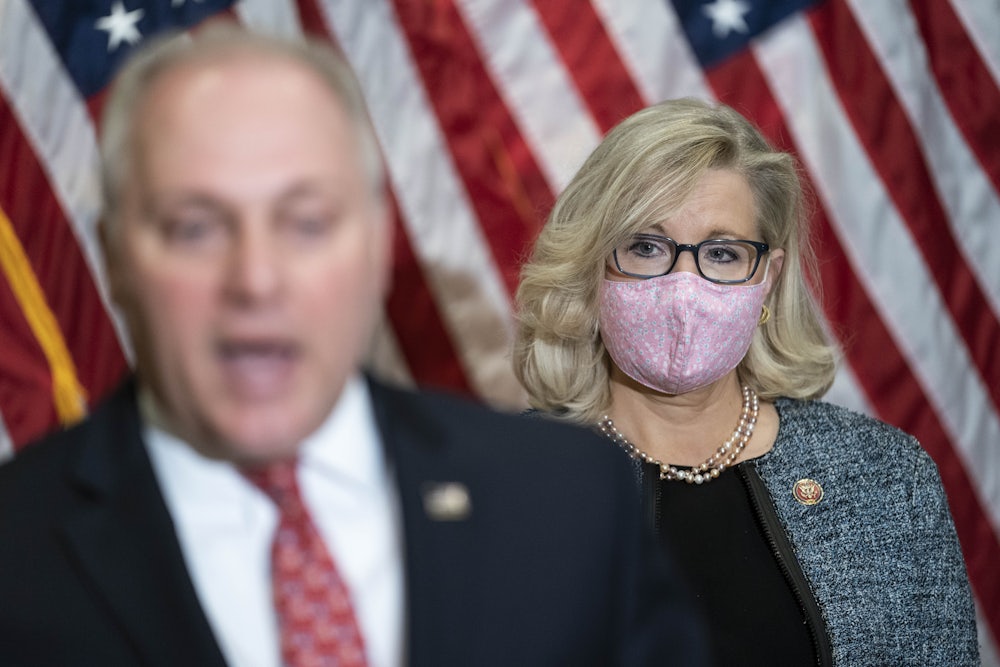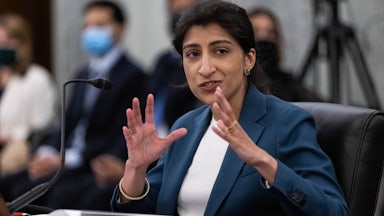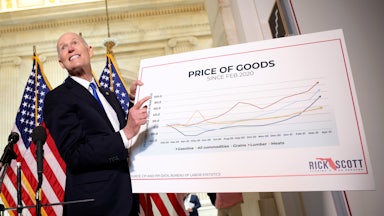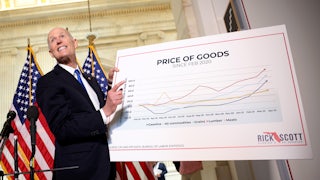Political pundits seem united in their belief that Democrats will struggle to hold the House of Representatives in 2022.
The historical precedent that the party out of power in the White House always gains in the midterms and the likely impact of partisan and racial gerrymandering has fostered a consensus that Democrats will lose seats.
They’re wrong. Democrats have the opportunity to widen the playing field in 2022 with the right candidates, a message focused on economic growth and—a surprise to some—a clear pro-democracy appeal designed to woo the one-quarter to one-third of Trump voters who are Liz Cheney Republicans.
My opinion is based on nearly 40 years in government and politics—but more importantly, it is based on the last eight months that I spent actively exploring a race for Tennessee’s 3rd congressional district.
I recently decided for personal and professional reasons that I cannot run in 2022. But through the testing the waters process, I discovered a path to possible victory in my east Tennessee district that should be replicable in many other similar districts around the nation.
I moved to Chattanooga, Tennessee, in 2002 after serving as chief of staff to then–New York City Public Advocate Mark Green, who had narrowly lost the mayoralty to Michael Bloomberg the year before. I went to work for Bob Corker—first overseeing implementation of reinventing government initiatives and then as city finance officer—shortly after he was elected in a non-partisan election as the city’s mayor and before his successful run as a Republican for the U.S. Senate in 2006.
Chattanooga—which makes up approximately one-quarter of the district—is the only city of more than 50,000 people in Tennessee’s 3rd district, and it is historically Democratic: When Corker first ran for Senate, he actually lost his hometown to Harold Ford. It is just over the state line from—and is the primary media market for—the Georgia congressional district served by Marjorie Taylor Greene.
The remainder of Hamilton County, suburban and rural areas outside of Chattanooga, accounts for another one-quarter of the district population: It is Republican turf and the home to the district’s five-term incumbent, Chuck Fleischmann. And half of the district vote comes from all or parts of 10 other counties, the largest being Anderson County, home to Oak Ridge National Laboratory.
For Democrats, the electoral math seems daunting. In Hamilton County, the most Democratic of the district’s counties, Donald Trump defeated Joe Biden 92,108 to 75,522 votes. And in Scott County, known as “the free state of Scott” for its support of the Union during the Civil War, Donald Trump beat Joe Biden by a margin of better than eight-to-one.
As for Fleischmann, he has never faced serious Democratic opposition. No Democrat running against him has ever received more than 36 percent of the vote. In large part, that’s because no Democrat has spent more than $300,000 on a race. His most recent opponent spent less than $100,000 and won just 31 percent of the vote.
In any other year, Tennessee’s 3rd district would seem to be the kind of hyper-partisan terrain where no Democrat would have a chance. In considering the race, I commissioned a “testing the waters” poll that seemed to indicate just that. A Global Strategy Group poll of 400 voters in May found that Donald Trump still had a 61–33 favorable/unfavorable rating in the district; Joe Biden had a 30-65 favorable/unfavorable; 61 percent of voters lived in households with guns; 57 percent of voters described themselves as conservative; and 54 percent of votes believe that abortion should be illegal in most or all cases.
Unlike other efforts to turn red districts to purple, Democrats in the 3rd cannot count solely on mobilizing the base. Black residents make up just 10 percent of the total population, and Latinos make up just 4 percent. Furthermore, economic messages that are wildly popular in other districts and nationally have limited effect among 3rd district voters, according to our poll.
So how could a Democrat possibly compete, let alone win?
The path to opportunity lies where I least expected it. Growing up, my father would always tell me that most people voted their pocketbooks—his own version of “it’s the economy, stupid.” And I had been in too many campaigns (including my own race for City Council in Brooklyn) where efforts focused on issues like corruption and campaign finance reform simply failed to get traction.
But to measure intensity, we asked voters a battery of questions to see if there were any disqualifying issues. For example, 15 percent of voters said that there was no chance that they would consider a candidate who supported mandatory background checks, and 40 percent said that there was no chance they would support a candidate who would allow refugees to come to the United States to escape violence—though 53 percent said that they would consider a pro-refugee candidate.
But the most surprising result was that 45 percent of poll respondents said that there was no chance that they would consider a candidate who voted to block the certification of the presidential election after the January 6 attack on the U.S. Capitol. Another 36 percent of voters said that they would consider such a candidate and another 19 percent said they did not know.
One-third of Trump voters, one-third of conservatives, 34 percent of Republicans, and 39 percent of Independents said that there was no chance that they would consider a candidate who voted to block certification.
Fleischmann voted against certification, after earlier alleging “fraud” and citing baseless claims that there were “substantial irregularities in several states.”
While an overwhelming majority of Republicans and conservatives in the district are on the wrong side of democracy, as much as one-third are pro-democracy Republicans for whom the insurrection and the vote against certification were the last straw. That’s not enough to win a Republican primary, but it is enough to create an interesting electoral dynamic in the general election.
How can Democrats take advantage of this narrow path?
We need the right candidates. A left-leaning Democrat in districts like the Tennessee 3rd is a non-starter. While pro-democracy Republicans may be open to opposing anti-democracy incumbents of their own party, they fear what they perceive to be the far left as much as the far right. Our poll found that 56 percent of voters would never consider a candidate who supported reductions in police funding to increase prevention programs. This is actually an area of potential attack by the right Democrat, who could point out that Republicans who opposed the HEROES Act and the Covid relief bill’s funding for local governments were, in fact, the real proponents of “defunding the police.”
And in races like this, rookies need not apply. Democrats need candidates who have a track record of community service that they can speak to—ideally examples where they have worked across the aisle with Republicans. Serious candidates will also need to show an ability and willingness to raise enough money to win—a key focus area for my testing the waters phase. That doesn’t mean raising more than the incumbent, but it does mean a capacity to raise the $1.5 million or so floor to be competitive.
Democrats also need to go to places where they rarely show up. Democrats have failed so many people who should be our most natural allies—the working poor in forgotten, largely rural places.
In exploring the race in the Tennessee 3rd, I worked with two of the county Democratic organizations in the district to host a series of on-line forums on the American Jobs Plan and American Families Plan. We focused one of those forums on poverty. Because while a city like Chattanooga and rural counties in Appalachia may seem to not have a lot in common, poverty is tragically one issue that bridges the urban-rural divide.
Scott County—where Donald Trump won by an overwhelming margin—is one of the most economically challenged places in the United States. Based on rankings compiled by the Appalachian Regional Commission, it is in the bottom 10 percent of all U.S. counties in poverty, income, and unemployment—with more than one-in-five residents living in poverty.
Democrats need to start showing up in Scott County. As of this writing, there is no Democratic county chair. They need to start listening to people and admitting that our standard 10-point plans too often leave out how to create meaningful change for these places and many who live there. This “Other America” is key to a Democratic future. Any candidate who doesn’t devote time and energy to these places is making a strategic blunder.
A tailored, place-based economic message is crucial. While pro-democracy Republicans may create the opportunity, Democrats will need to drive a message that focuses on the economic recovery and the benefits of the Rescue Plan, the Jobs Plan, and the Families Plan. In different districts, different elements of the recovery will resonate. They key is identifying how the recovery is benefiting real people.
Finally, in every district, the 2022 election needs to start today. In too many red districts, there is an issue and media echo chamber. The only voices on national policy are locally elected Republicans. For voters who rely on local news, it is a one-sided conversation.
It does not cost a lot of time or effort to change that conversation. As important as our issue forums were as an organizing tool, they were even more important as a means of taking the debate to the Republicans representing East Tennessee. The issue forums generated a front-page story, a lead business story, and an editorial in the largest local newspaper in the district, as well as a top story on local news one night. The issue forums forced Fleischmann into responding that he was “vehemently opposed” to the American Jobs Plan, only to go on Fox News a few weeks later suggesting a bipartisan alternative—which he then voted against.
Forty-three years ago, when I was still a Brooklyn high school student, I told a New York Post reporter that one day I hoped to run for Congress. My pursuit of a race in the Tennessee 3rd was not, however, about my quest to fulfill a boyhood dream.
I started to think about running for Congress because unless all of us do more, we can lose our democracy. Even before the January 6 insurrection, causes and issues that I had worked on over a lifetime were at risk. I joined the millions who wrote checks, sent texts, and made phone calls before the November 2020 election and the January 2021 election in neighboring Georgia. But the narrowness of the margin of victory convinced me that I had to do more.
For me, doing more will mean something other than a race in the Tennessee 3rd. But hopefully, it may also mean convincing others that it is the right time to run—even in districts that seem out of reach. Right now, it is among the highest forms of patriotism that I can think of.








